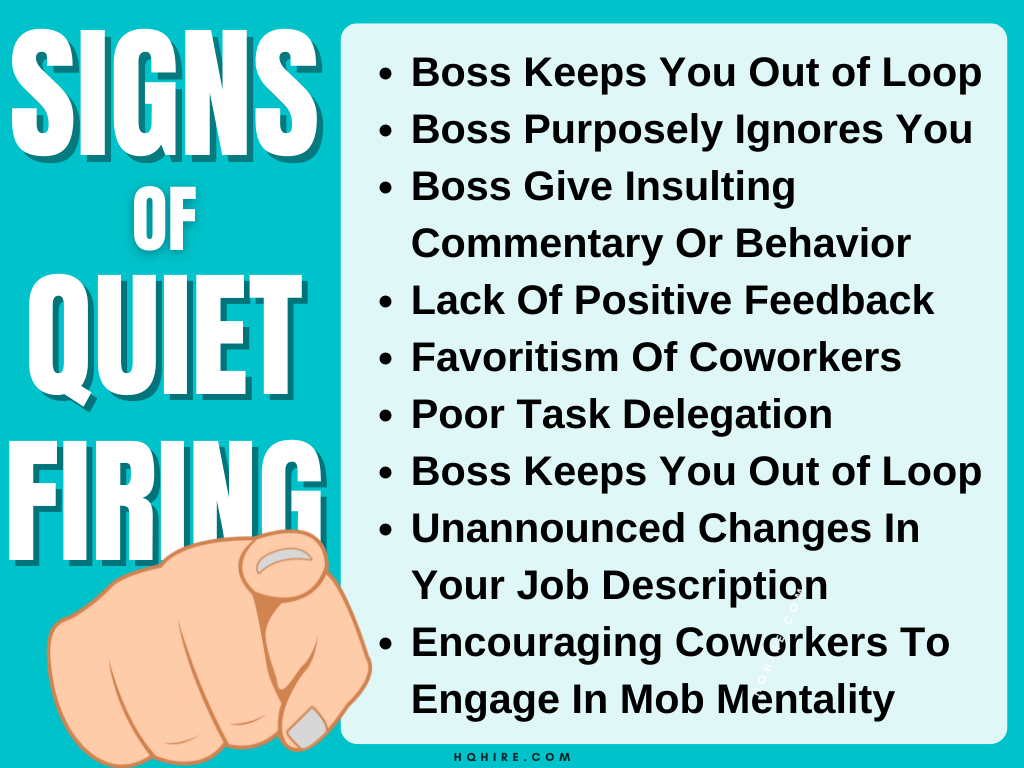Ever have a supervisor at your job who made your life so miserable that you quit? They don’t actually say they want you to leave. However, all their actions speak otherwise.
They don’t give acknowledgment, positive feedback, and/or interact with you in any way, among a host of other things.
This is the concept of “quiet firing” where a boss or manager fires you without telling you outright. They make your work life unbearable, difficult, and unpleasant to the point you leave the job on your own.
Unlike quiet quitting, where often the reasons are sometimes understandable, quiet firing is disgusting and dirty. It is the very definition of a bad boss. Quiet firing is totally not acceptable and can have a major negative effect on the company.
What Are The Signs Of Quiet Firing?
Quiet firing is a subtle tactic to get someone to quit his or her job. But, learning how to spot quiet firing will help mitigate the resulting frustration.
This article will show you how to identify the top 8 signs of quiet firing and what you’ll need to do when you spot these signs.

1. Poor or Outlandish Duty/Task Delegation
One of the biggest indicators of quiet firing is when your boss or manager delegates tasks, duties, and other projects in a poor or outlandish manner. For instance, at one time they gave you certain assignments because you produced consistent, solid results. But, it slowly changed.
Another way this can play out is that your superior makes you write out everything you do, gives you the worst tasks, or provides unreasonable amounts of work. This shows they are intentionally trying to see you fail at your job. They are creating a situation of self-fulfilling prophecy by being purposeful in this way.
What to Do About It
If poor or outlandish delegation is a concern, speak with your boss directly. Don’t be confrontational but you should also be firm in your position. Inquire why assignments changed and/or why the workload increased. Look them directly in the eyes too.
If they avoid your gaze and/or provide a lackluster answer, you will know quiet firing is in progress. In the event things don’t improve afterward, go to a higher-up with proof. If there is no one higher, it may be time to look elsewhere for work.
2. The Boss Keeps You Out of the Loop
Another big red flag of quiet firing is how your superior keeps you out of the loop. They fail to send you important office memos, emails, and other such pertinent information. They may even then blame you for not having read any of it.
Everyone else will receive these important items but your boss seems to leave you out on purpose. Of course, this would have to be a consistent problem to indicate quiet firing; sometimes people make honest mistakes.
What to Do About It
If you are friendly with any of your coworkers and they see how the boss is treating you, ask them to forward or send you these communiqués. This way you’ll always have them and your boss won’t be able to come down on you.
3. Unannounced Changes in Your Job Title and/or Description
While most leadership roles have the right to change your job description or title at any given moment, it can be a sign of quiet firing. This has more subtlety and nuance than other signs mentioned here. So, you have to be cautious with this one.
But, when your boss or manager changes your title or job description and doesn’t tell you about it, they could be sending you warning signals. However, this activity should accompany other signs.
What to Do About It
There’s really nothing you can do to stop your boss from changing your job title or description. If there is someone above, then lodge a complaint or air your grievances. But, you may want to consider resigning if the change is too severe for comfort.
4. Manager Purposely Avoids; Ignores You
The reason why most bosses engage in quiet firing is that they don’t have a backbone for direct confrontation. They quite possibly lack the skill set necessary to discuss what they don’t like about you or your work ethic. Therefore, such a person will go out of their way to avoid you.
They could also ignore your input during meetings, never make eye contact, say hello/goodbye, and other such behaviors.
What to Do About It
Try talking to your manager about their avoidance of you. But, don’t be accusatory. You should come up with evidence for their behavior and listen to what they have to say in response.
You could also attempt pointing out your boss’s avoidance to other coworkers. Getting someone else to vouch for you may be the best way to stop this.
5. Rude, Insulting; Mocking Commentary/Behavior
When you have a boss who shoots rude, insulting, or mocking commentary, it’s a sure sign of quiet firing. They won’t tell you what their real problem is with you but this person will certainly take jabs at you any chance they get. But, it’s important to understand this is a deflection.
Oftentimes, when people attack others like this, it’s about their inferiority complex. They want you to feel as badly about yourself as they do about themselves.
What to Do About It
There are a couple of approaches for this sign of quiet firing. The first is to ignore it. They’re trying to get a rise out of you and the best defense is to show them it doesn’t bother you. Let it roll off without a care in the world.
The other thing you can try is to learn how to be subtle with sarcasm. But, you want to be careful with this and avoid coming down to their level. However, quick-witted sarcasm can be just the thing to get someone to stop speaking to you in negative ways.
6. Lack of Positive Feedback and Poor Performance Reviews
When your boss will never give you an inkling of positive feedback or it always seems you receive poor reviews about your work performance, it could definitely be a sign of quiet firing. Once again, this activity should accompany other behaviors on this list to ensure that’s what is happening.
Many managers understand that positive feedback is key to keeping employees happy, motivated, and engaged. When a boss fails to do this, it’s often intentional.
What to Do About It
While you cannot make someone speak positively or give a stellar performance review, you can mitigate the effects. Collect opinions, reviews, and other support from clients, customers, and coworkers. When it comes time to have a meeting about your performance, present these.
7. Clear Favoritism or Preferential Treatment of Coworkers
Favoritism and preferential treatment of fellow coworkers is a tell-all signs that your boss is trying to fire you quietly. They’ll show your coworkers kindness and be the type of boss they should also be toward you. They may even be belligerent in their favoritism, almost being obtuse in their display.
This will often be in conjunction with other signs like rude commentary, avoidance, and lack of positive feedback, for example.
What to Do About It
If you find yourself in this position with your boss, don’t show them it bothers you. They’re doing it to make you feel bad with the hopes you’ll leave the company or organization. What you should do is engage in favoritism with them.
When your manager outright praises your coworker, add to the accolades. This will surely drive your boss crazy enough to stop because it’s not working on you the way they want.
8. Encouraging Coworkers to Engage in Mob Mentality
Because misery loves company, some bosses may encourage coworkers to engage in a mob mentality. They will talk behind your back and get others riled up on their account. Your coworkers will side with your boss and this can play out in a myriad of ways.
For instance, they might mess with your personal space, steal your lunch out of the fridge, or exercise general unkindness.
What to Do About It
If this happens, the best thing is to leave the job altogether. There’s no reason why you should have to put up with this kind of treatment. After all, you’re better than this and certainly, there’s an organization out there that would be better suited to you and your talents.
Quiet Firing Today
Quiet firing is a new term for an old concept. At its most basic core, it’s a boss trying to get rid of someone without them outright saying, “you’re fired!” If you find yourself constantly walking on eggshells at work, you’ll know quiet firing is underway. This is a very bad work environment, and knowing how to identify them is important.
When this happens, though, it’s a good idea to start looking for work elsewhere if you can. Reading these articles will become important.
- Know when is the best time to quit.
- How to prepare to quit your job professionally.
- How to quit a job you just started.
- Getting a better job.
Often, when your boss decided to quiet fire you, the chances for your relationship to improve are slim, and communication breakdowns are a frequent occurrence.
But if you are still confused, taking this short quiz may help:
Read Also:
- Is Your Manager a Boss or a Leader? 7 Key Difference of Boss vs Leader
- Empathetic Leadership Style Can Change Your Future (Here’s Why)
- Coaching Leadership Style Works? (Here’s The Truth)
- 10 Basic Types of Leadership Styles and How to Find Your Own
- What is Democratic Leadership and Will it Work for You?
Join over 11,000+ achievers who are committed to achieving their career goals!






